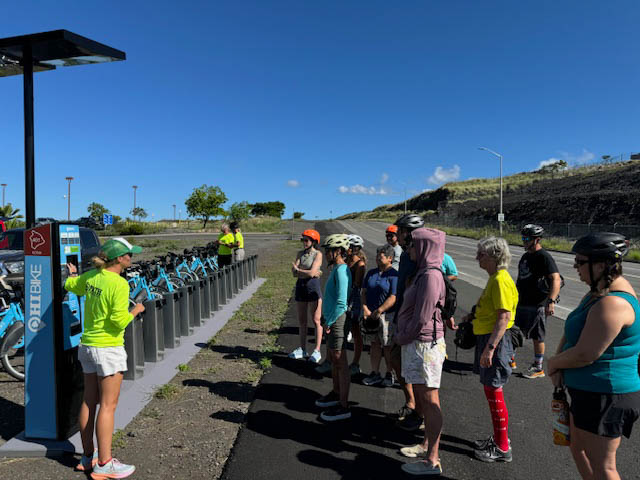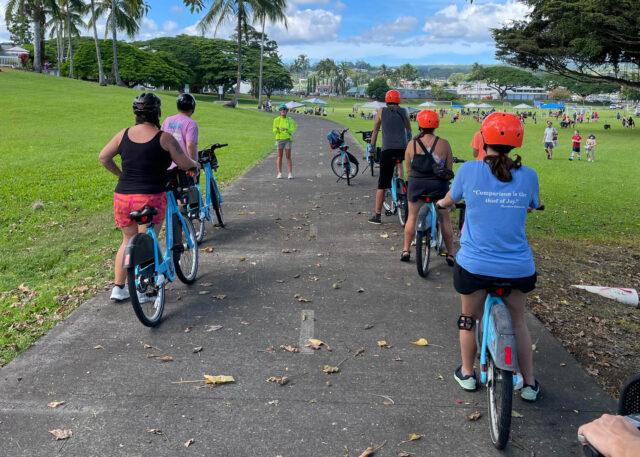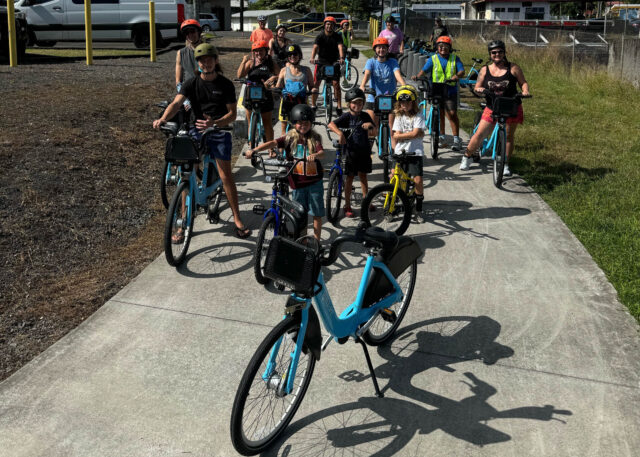Bringing New Riders to Bike Share in Hawai’i
by Odochi Akwani, Writer and Content Manager
October 31, 2024
HIBIKE, is working to grow ridership among island residents through targeted outreach, education, and a partnership with its local transit agency.

The mission of nonprofit People for Active Transportation Hawaiʻi (PATH) is to champion and educate on safe, accessible, and active transportation opportunities in communities throughout the island of Hawai’i. According to PATH’s Chief Operations Officer Kelly Hudick, the group saw the local bike share system, HIBIKE, was being utilized, but it was primarily by visitors — not island residents.
To educate locals on how HIBIKE could be incorporated into their daily lives and highlight its expansion, HIBIKE applied for a BBSP mini-grant earlier this year to host community bike rides in Hilo and Kailua-Kona where the system operates. In November 2023, HIBIKE added 12 new bike share stations — six in both Hilo and Kailua-Kona.
“I wanted to help people that live here, who may not be familiar with the program, learn how easy it is to use the bike share system, especially because we have a partnership with our mass transit agency,” says Hudik. “If you use the Hele-On bus system, you can ask the driver for a code that allows you to use the bike share for unlimited 30-minute rides for 24 hours. It’s a great way for people to be able to use both the free bus system and the bike share.”
This ‘Hele-On, Ride On’ partnership began as part of the County of Hawai’i Transit and Multi-Modal Transportation Master Plan. According to Kudik, as the Hele-On/County of Hawai’i Mass Transit Agency expanded to include additional bus routes, the agency wanted to highlight this first-mile/last-mile option since the bus is free. Currently, about 4-6 riders use the free code with the Hele-On system each month.
Fast forward to today, PATH hosted two community bike rides for about 10-15 residents at each ride in the last few months. The Kailua-Kona ride brought out an older adult population while the Hilo ride saw a younger group of participants. According to Hudik, most participants had not ridden a bike in a long time and only one person in either group had used HIBIKE in the past.
The rides began with an introduction on how to use HIBIKE followed by bike safety tips. Participants then rode down the Ane Keohokalole bike path in Kailua-Kona or the Hilo Bayfront Trails, stopping halfway through the ride for more bike safety tips before returning home.

“One of the things that I like to highlight, too, is that if you are aware of how to be a safe cyclist, when you’re driving, you also are aware of where cyclists are supposed to be on the road or how to anticipate where those cyclists are going to be on the road,” says Hudik. “It’s a way to give both perspectives.”
Some participants were recruited from a safe driving conference in Hilo and brought along their children to learn safe riding tips as well. Other participants were recruited from the Hawai’i Island Community Health Center to engage their clients who live in low-income areas on the island.

According to Hudik, some people on the island assume the bike share system is cost-prohibitive and just for tourists. Hudik hopes to continue these rides once a month alternating between Hilo and Kailua-Kona to keep connecting residents to the system and help them understand the benefits of using it as a first-mile/last-mile option with the bus system or as a method of daily transportation.
